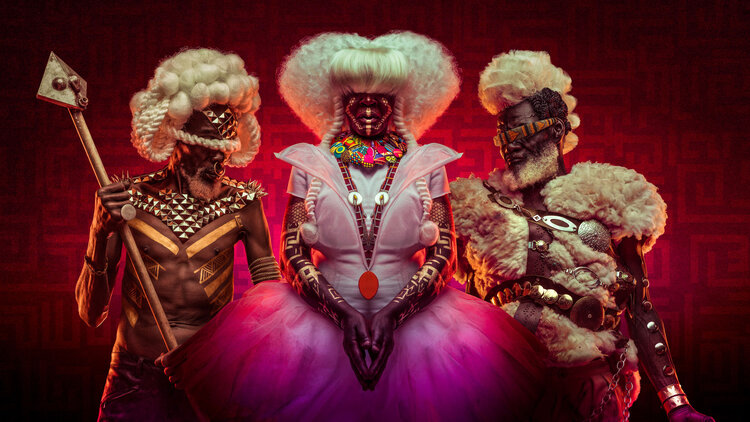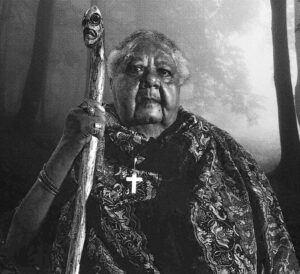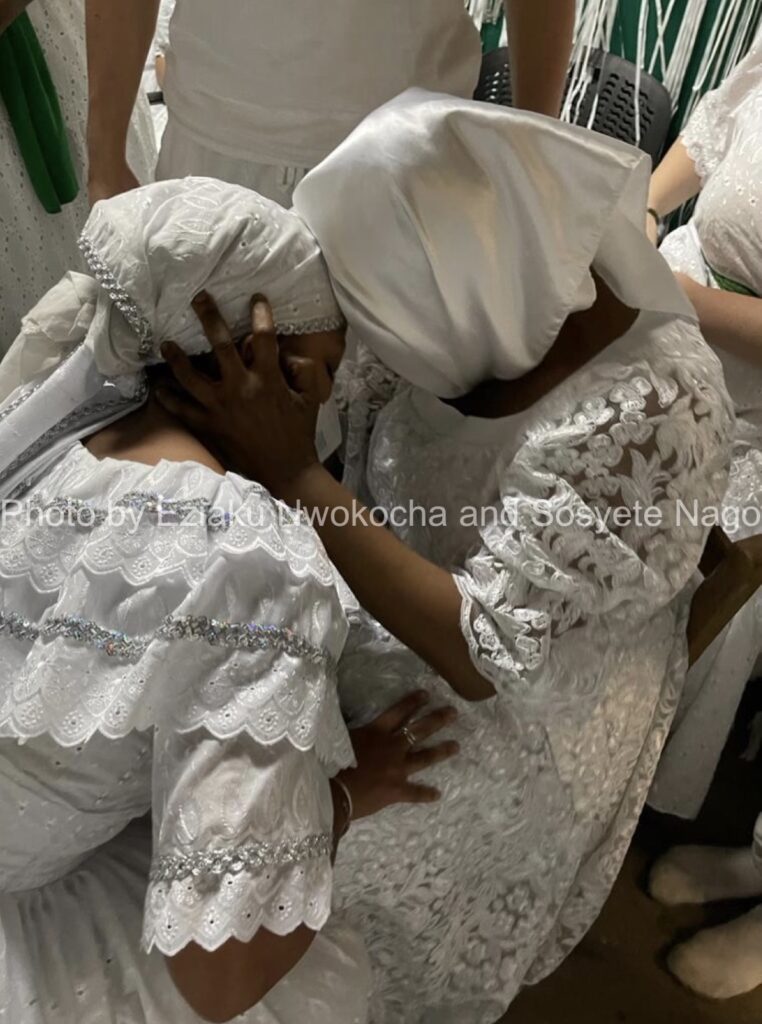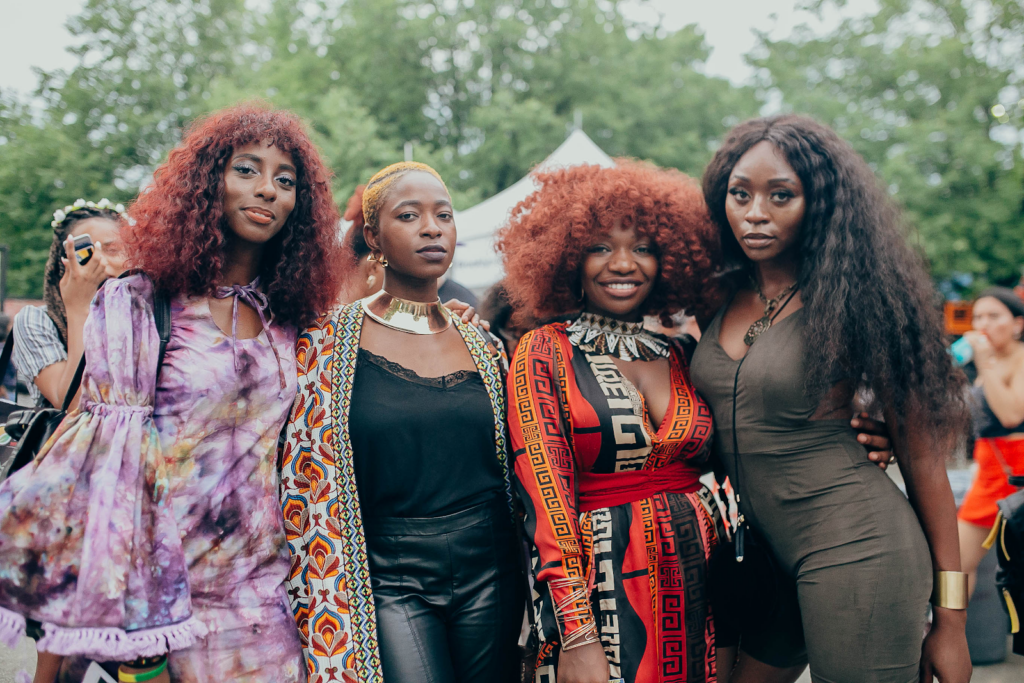Teaching
Black Religion in Literature: Afrofuturism and Africanjujuism

Af·ro·fu·tur·ism
/afrōˈfyo͞oCHərizəm/ (noun)
– a movement in literature, music, art, etc., featuring futuristic or science fiction themes which incorporate elements of black history and culture (dictionary.com).
– a cultural aesthetic, philosophy of science, and philosophy of history that explores the developing intersection of African/African Diaspora culture with technology (Wikipedia).
Africanjujuism:
“Africanjujuism is a subcategory of fantasy that respectfully acknowledges the seamless blend of true existing African spiritualities and cosmologies with the imaginative”- Nnedi Okorafor
“Some of the African traditions that many think are fantasy are real & it’s woven in seamlessly with that which is made up. & because these traditions are known by so so few, this isn’t well understood” Nnedi Okorafor via Twitter. Nov 17, 2018
Course Description: This course introduces we will explore the history and religious creative genre of Afrofuturism, Africanfuturism and Africanjujism. We begin by considering the literary and scholastic works on Afrofuturism by focusing on the works of three writers and scholars: N.K. Jeminsin, Nnedi Okorafor and Toni Morisson. In between, we will discuss issues of religion, language, dialect, political art, music, genre, and gender as we read poems, novels, speeches and short stories. Additionally, we will consider questions like what role has writing by Black religion played in the sci-fi and fantasy? How has this genre of writing been shaped by different ways of thinking about race and religion ? How has race and religion, in turn, been shaped or constructed by that writing? And how do representations of gender and sexuality participate in a literary construction of race and religion?
This survey course is designed to involve students in the kinds of research that the discipline of religion and literary studies currently demands, including: working with primary sources and archival materials; reviewing the critical literature; using online databases of historical newspapers, periodicals, and other cultural materials; exploring relevant contexts in religion, literary, linguistic, and cultural history; studying the etymological history and changing meanings of words; experimenting with new methods of computational analysis of texts; and other methodologies. At the end of the semester, students will present their final paper project idea in a creative form (i.e. Power Point presentation et al.). Make this presentation creative! The final project must emerge out of each student’s intensive, independent research agenda.
Anthropology of Religion
Course Description: What does it mean to study religion anthropologically? What are the methods that are used to examine lived religion? This course introduces students to anthropological approaches of studying religion. We will explore multiple religious beliefs, meanings, experiences, expressions and practices across diverse sociocultural environments. Through an engagement with anthropological works on ritual, myth, sacrifice, death, symbol, gender, healing, religious activism, and identities, to name a few, we will learn how religion is understood, experienced, and expressed across different sociocultural environments, both in the past, and within the contemporary moment. Throughout the course students will pursue individual research projects that will allow them to deepen their understanding of a specific question pertaining to religion and gain training in research, writing and presentation skills. The course also exposes introductory-level students to diverse world religious traditions: African and African Diasporic Religions, Religions in Latin America, U.S religious traditions and more.
African American Religion
 Course Description: This course introduces you to the variety of African American religions that developed in the U.S. The historical and ethnographical contexts surrounding the development of African American religions and the lived experiences of African Americans are the main topics of our course. The class includes discussion of West African and Central African religions, the impact of the Atlantic slave trade, the role of politics, the construction of racial identities, and most importantly, the diversity of African American religions.
Course Description: This course introduces you to the variety of African American religions that developed in the U.S. The historical and ethnographical contexts surrounding the development of African American religions and the lived experiences of African Americans are the main topics of our course. The class includes discussion of West African and Central African religions, the impact of the Atlantic slave trade, the role of politics, the construction of racial identities, and most importantly, the diversity of African American religions.
Thematically, we will work through concepts of the religion such as: memory, myth and authenticity; ritual and material practices; borders, migration, gender and sexuality, religious commodities and exchange.
As we traverse through these various religious traditions, it is through the readings, lectures, invited speakers, films and class discussions that we will develop a complex understanding of integrative religious worldviews that impacts every aspect of life: family structure, gender relations, education, healing, economics, politics, arts, and so on.
Religion and Gender

Course Description: This class explores the lives of gendered peoples in multiple religious traditions: Indigenous, African, African Diasporic, Hindu, Christian, and Muslim. We will explore the following concepts and issues: religion’s shaping influence on patriarchy, intersectionality and feminism, social location (how one’s sex, race, culture, religion, economic class, sexual orientation, age, etc., shape our attitudes and assumptions); the differences between sex, gender, and sexual orientation; social privilege of various kinds: authority, religious and otherwise; body image; religious freedom; and social justice. By the end of this course, students will gain theoretical knowledge and analytical tools that will enable them to critically examine the gendered dimensions of religion within a historical and global context.
Divinities, Diviners, and Divinations: Religions of the African Diaspora


Course Description: This course is designed to provide students with a broad introduction to major themes within African Diasporic Religions. We will be drawing on various historical method i.e historical, ethnographical, and autobiographical. Additionally, we will be examining visual media to understand the presence and value of African Diasporic Religions in the 20th/21st century. Special attention will be given to Vodou, Santeria, and Candomble in the Americas.
Thematically, we will work through concepts of the diaspora; memory, myth and authenticity; ritual and material practices; borders, migration, gender and sexuality, religious commodities and exchange. As we traverse through these various religious traditions, it is through the readings, lectures, invited speakers, films and class discussions that we will develop a complex understanding of integrative religious worldviews that impacts every aspect of life: family structure, gender relations, education, healing, economics, politics, arts, and so on.
AMST 114-7 &11: Topics in American Studies
 Attendees of AfroPunk 2018.Photo: Makeda Sandford
Attendees of AfroPunk 2018.Photo: Makeda Sandford
OVERVIEW
In Topics in American Studies, students examine a series of pressuring current politics, economic and/or social issues in the United States. Using perspectives from fields such as history, sociology, ethnic studies, religious studies, and political science, students and faculty will work together to trace the longer-term developments that have shaped the modern United State, and to examine competing interpretations of and responses to them. Topics may include current issues such as healthcare, immigration, race, foreign policy, gender, economic inequality, sexuality, electoral politics, criminal justice, the environment, and religion. This is the first touchstone course in the Hallmarks Core, where students will learn about the Hallmarks Folio process and post artifacts and reflections from their first-year course work.
TOPICS IN AMERICAN STUDIES
Each instructor of AMST at Thomas Jefferson University has selected a different set of topics as the focus of their class, loosely organized into three units. In Topics in American Studies with Professor Nwokocha, we will survey three units on significant topics within the field of American Studies in the United States. We will cover units on Black Atlantic Religious, Black Feminist thought, and Afrofuturism as they relate to issues of religion, gender and sexuality.
Unit one –Black Atlantic Religions: We will understand various Black Atlantic religious traditions that are practiced in the U.S and how their gendered practices within the possession process, the vibrant spiritual energy that sustains communal connections during religious ceremonies and their transnational ties to the broader Americas animate lived religions.
Unit two– Black Feminist Thought: We will interrogate key issues and debated on Black feminist thought. By understanding gender oppression, antiracism critiques this unit centralizes Black women’s experiences and expressive cultures. Using contemporary feminist theories, films, and cultural production we can discuss the overall project of social justice including allyship and relational ethics.
Unit three– Afro Futurism: Afrofuturism is a black aesthetic practice that combines elements of African mythology, science fiction, African Diaspora history, magic realism and political fantasy in black expressive texts across multiple media and artistic forms. Rooted in the generalized practice of “imagining otherwise,” Afrofuturism expresses the concerns, experiences, and longings of black people throughout the African Diaspora. We will examine the ways that the various speculative world created by U.S authors reimagine racial and ethnic differences, as well as well as differences of gender, class and nationality, and to think how these reimaginings reflect upon on the author’s historical moment and our own.
This course focuses on the development of close reading skills, engaging closely with the ethnographic, historical and literary texts we examine this semester, and using these readings as the basis for making original arguments about some of the above themes or issues. By the end of this course it is with my hope that we improve upon our critical writing skills– the class will require a significant amount of writing, both in and out of class. Some will be higher stakes (graded), some will be lower stakes, but we will proceed from the assumption that writing is a practice, and we will be practicing this skill consistently. The topics examined in this course represent but a sampling of some of the major themes that animate debate, contention, and conflict. It is my hope that our inquiry during the semester will provide you with a base of knowledge and analytical tools with which to continue your exploration of American society, making you more informed as citizens, professionals, and human beings.
Spirit Possession in Caribbean Religions
 Course Description: This course is designed to provide students with a broad introduction to possession experiences in Caribbean Religions. Through historical, ethnographic, autobiographical, literary and visual texts this course examines complex, gendered practices within the possession process, the vibrant spiritual energy that sustains communal connections during religious ceremonies, and the transnational imaginations that animate Caribbean religious practices in the Americas. Special attention will be given to Santeria, Candomble, Vodou, Myal, Palo Monte, and Revival Zion in the Americas.
Course Description: This course is designed to provide students with a broad introduction to possession experiences in Caribbean Religions. Through historical, ethnographic, autobiographical, literary and visual texts this course examines complex, gendered practices within the possession process, the vibrant spiritual energy that sustains communal connections during religious ceremonies, and the transnational imaginations that animate Caribbean religious practices in the Americas. Special attention will be given to Santeria, Candomble, Vodou, Myal, Palo Monte, and Revival Zion in the Americas.
Possession is a process through which gender and sexuality can be performed, contesting national and regional discourses of sexuality, gender, and race in the Caribbean. Thematically, we will work through concepts of memory, community, adornment, ritual, borders, and the senses. We will investigate religious ritual practices to understand various religious worldviews that shape communities’ religious and social lives.
“Voodoo” to Wakanda: Black Atlantic Religious Imaginaries in Film and Media


Course Description: This course will introduce students to the study of Black Atlantic religions by exploring why these traditions—usually in sensationalistic forms—appear so frequently in American pop culture products. The course quickly moves beyond the simple question of whether such products accurately depict these religions, and focuses on exploring how they create and maintain cultural and racial boundaries. While the special focus of the course will be Haitian Vodou, students will also explore Regla de Ocha (Santería), Palo, Candomblé, and conjure/hoodoo.
Course materials will include scholarly depictions of Black Atlantic religions within popular stories, novels, films, and television shows. In addition to the weekly assigned readings, students will be expected to have watched the assigned films. Many of the films are short, while others are only short clips. Some will be viewed together in class, and others will need to be viewed prior to class meetings. The instructor will help students organize group film viewings. Students are forewarned that some course materials may possibly include depictions of violence and sexually explicit scenes—and an emphasis will be placed on critically deconstructing these images, rather than passively receiving them. Students can buy as many or as few of the assigned texts as they wish. We only read selections from most textbooks, and therefore it is possible in many cases to make copies from texts that will be placed on reserve at the library. Many of the readings will also be placed on the course website as PDFs. Every effort will be made to guarantee that all of the assigned films are also available on reserve at the library, where they can be viewed for free, at the student’s convenience.